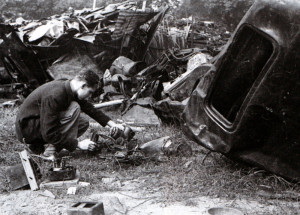
“Come back when you’ve put a bit o’ beef on ya bonny lad,” he told me in his blunt Geordie accent. I could have cried, but 14-year-old boys didn’t cry.
The church hall was being used as an Air Raid Precaution centre and he was the Chief Warden.
He was full of importance as he sat behind a trestle table wearing his regulation navy blue boiler suit with a white ARP armband on his right sleeve. His white steel helmet, stencilled with the letters ARP, hung from a hook on the
wall. How I yearned to wear one.
I knew him as Mr Fletcher, our milkman, but here he was quite clearly the boss. I had asked two or three times before if I could join up, as I wanted to do my bit for the war. Always his reply was the same. I knew I was skinny; I was doing some exercises, but they didn’t seem to help.
One night I went in when the wardens were particularly busy and they let me make the tea. After that, I went
there most nights and made the tea or swept up and the like. The best nights were when there wasn’t much to do and we would sit listening to ITMA on the wireless. I was quite a good mimic and became popular in the ARP centre, although I longed to do something official. Our house was directly opposite the church hall, so my parents knew I was in safe hands. I was always sent home directly after the nine o’clock news.
I didn’t go to the centre when there was an air raid on, as I’d be in the shelter with my family. Besides, the wardens would be too busy to be bothered by the likes of me.
One night while I was in the centre, there was a terrific explosion. The place shook, the lights went out, and tables and chairs scattered as we all instinctively went flat on the floor. We weren’t sure at first if it was a bomb, as the siren hadn’t gone. Torches were quickly found and things organised. Electricity and telephones were off.
The wardens went to investigate, leaving just Mr Fletcher and me. I knew that he was worried, as he frantically wound the handle on the emergency telephone without success.
Gradually the wardens began to return. Without exception they were covered in dust, their sad eyes glistening in the candlelight as they reported to Mr Fletcher. I didn’t hear the details, but it was obvious that things were pretty serious. Mr Fletcher was pacing up and down in the semi-darkness, puffing on his Woodbine, deep in thought. Many of the wardens were lying on the floor, exhausted, and one or two were bandaged. They all brought with them that peculiar smell that comes after a bombing.
I thought I would be sent home, and that I didn’t belong among this sad bedlam. But I had managed to get a paraffin stove going and offered a mug of tea to Mr Fletcher. Absent-mindedly he took it and then he looked directly at me.
“Have you got a bike son?” he asked. Puzzled, I replied that I had, and wondered for an instant if he had gone off his rocker.
“Go an’ fetch it,” he said, “and report back to me. Look sharp now.”
I was back in a jiffy. “Do you know where Devonshire Place is?” Mr Fletcher asked.
“Aye, I think so,” I answered, “it’s them posh houses just off King Street, isn’t it?”
“That’ it,” he said. “Now listen carefully, son. I want you to take this and deliver it
to Major Adams at number four. No muckin’ about, mind. Get there as quick as you possibly can.”
“Yes, Sir,” I replied, only just stopping myself from saluting.
“You’d better take this -and be careful now,” he said as he handed me a bicycle lamp. It had a piece of black tin covering the glass with a narrow slit cut out.
The journey was long and difficult with debris on the blacked out roads, but I got there and delivered the envelope to Major Adams. He asked my name and age and advised me to return home.
A week later, Mam and Dad got a letter asking them to bring me to the ARP centre. I had visions of being court marshalled and had to be dragged across the road. I was marched up to the trestle table, behind which sat a stern faced Mr Fletcher. The proceedings were short and sharp. Without preamble,
Mr Fletcher said, “You did a really good job last Tuesday night, son, so me ‘n the lads would like to give you these.”
He handed over a neatly folded blue boiler suit and on top of it, like a crown on a velvet cushion, sat a white steel helmet. On the front was a carefully painted letter M.
I was now a fully qualified messenger. Ecstasy!
Ron Williamson








